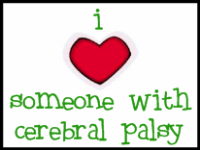 Every year, 20 million babies are born too soon, too small and often very sick. Both Sarah and her brother were born prematurely, each of them vulnerable to serious health challenges. As parents, my husband and I know the joy of two precious little miracles, as well as the fear and anxiety we felt when our babies were in the NICU, too fragile to bring home. But while Joshua is now developing normally, Sarah's battle with the ravages of meningitis that struck without warning and which have resulted in lifelong disabilities is only unfolding. Please join us and other bloggers in the March of Dimes' Fight for Preemies event on November 17th by clicking on the image above to find out how.
Every year, 20 million babies are born too soon, too small and often very sick. Both Sarah and her brother were born prematurely, each of them vulnerable to serious health challenges. As parents, my husband and I know the joy of two precious little miracles, as well as the fear and anxiety we felt when our babies were in the NICU, too fragile to bring home. But while Joshua is now developing normally, Sarah's battle with the ravages of meningitis that struck without warning and which have resulted in lifelong disabilities is only unfolding. Please join us and other bloggers in the March of Dimes' Fight for Preemies event on November 17th by clicking on the image above to find out how.
Showing posts with label meningitis. Show all posts
Showing posts with label meningitis. Show all posts
Help Fight For Healthy Babies
Labels: advocacy, meningitis, premature birth, video Every year, 20 million babies are born too soon, too small and often very sick. Both Sarah and her brother were born prematurely, each of them vulnerable to serious health challenges. As parents, my husband and I know the joy of two precious little miracles, as well as the fear and anxiety we felt when our babies were in the NICU, too fragile to bring home. But while Joshua is now developing normally, Sarah's battle with the ravages of meningitis that struck without warning and which have resulted in lifelong disabilities is only unfolding. Please join us and other bloggers in the March of Dimes' Fight for Preemies event on November 17th by clicking on the image above to find out how.
Every year, 20 million babies are born too soon, too small and often very sick. Both Sarah and her brother were born prematurely, each of them vulnerable to serious health challenges. As parents, my husband and I know the joy of two precious little miracles, as well as the fear and anxiety we felt when our babies were in the NICU, too fragile to bring home. But while Joshua is now developing normally, Sarah's battle with the ravages of meningitis that struck without warning and which have resulted in lifelong disabilities is only unfolding. Please join us and other bloggers in the March of Dimes' Fight for Preemies event on November 17th by clicking on the image above to find out how.Step By Step
Labels: CDC, gait training, GBS, meningitis, treatment
According to information published by the US Centers for Disease Control and Prevention (CDC), group B streptococcal (GBS) disease has been the leading bacterial infection associated with illness and death among newborns in the United States since it first emerged in the 1970s. In infants, GBS disease, the very same syndrome that befell Sarah, is characterized as either early-onset (occurring in infants <7 days of age) or late onset (occurring in infants >7 days of age). And, as also with Sarah, who was born a "preemie," approximately 25% of the cases of neonatal GBS disease occurs in premature infants. In her case, GBS disease manifested itself as neonatal meningitis. Overall, the case-fatality rate for GBS disease is estimated to be 5%–20% for newborns.
Like Sarah, survivors of neonatal meningitis are more likely to have moderate-to-severe disabilities than are other children, including cerebral palsy, seizures, cognitive and learning deficits, visual and hearing problems, and often other, more subtle disorders. Growing up with the long term effects of neonatal meningitis, or persistent brain injuries, means taking each new day one step at a time. Among the various treatments we have experienced are:
0
comments
Posted by
Sarah's Mom
at
12:26 PM Permalink
Like Sarah, survivors of neonatal meningitis are more likely to have moderate-to-severe disabilities than are other children, including cerebral palsy, seizures, cognitive and learning deficits, visual and hearing problems, and often other, more subtle disorders. Growing up with the long term effects of neonatal meningitis, or persistent brain injuries, means taking each new day one step at a time. Among the various treatments we have experienced are:
- Drug therapy to prevent or control seizures associated with her cerebral palsy (CP) and/or to help reduce painful spasticity in her muscles.
- Botox injections to provide reduced spasticity, increase range of motion, and reduce continuous fisting of her hands.
- Gait training using a special device that simultaneously controls Sarah's weight-bearing ability, posture, and balance over a treadmill or over ground.
- Patterning (both physical and auditory), in which Sarah lies down while others move her arms and legs or repeat sounds (often with music) for mimicry in a way that is said to stimulate brain activity.
- Dietary considerations to watch her weight since she's not as mobile as we hope she will become.
Below is a short video clip that demonstrates how a gait trainer is used. For now, Sarah must use her wheelchair most of the time, and, of course, she's much younger than the young child viewed in the video. But as Sarah faces her challenges, every day brings new advances -- step by step.
Subscribe to:
Posts (Atom)










